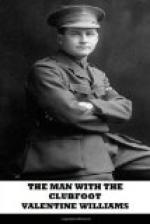“Pst!” I called to him, drawing my pistol from my pocket. As I did so, Francis behind me touched my arm to let me know he was there.
“Pst!” I called again louder.
The man swung round on to his knees with a sudden, frightened spring. When he saw my pistol, he jerked his hands above his head. Dirty and unshaven, with the tears all wet on his face, he looked a woe-begone and tragic figure.
“Kamerad! Kamerad!” he muttered stupidly at me. “Napoo! Kaput! Englander!”
I gazed at the stranger, hardly able to believe my ears. That trench jargon in this place!
“Are you English?” I asked him.
At the sound of my voice he stared about him wildly.
“Ay, I be English, zur,” he replied with a strong West Country burr, “God help me!” And, heedless of me and my pistol, he covered his face with his hands and burst into a wild fit of sobbing again, rocking himself to and fro in his grief.
“Go back to Monica!” I whispered to Francis. “I’ll see to this fellow!”
I managed to pacify him presently. Habit is a tenacious ruler and, grotesque figures though we were, the “zur” he had addressed to me brought out the officer in me. I talked to him as I would have done to one of my own men, and he quietened down at last and looked up at me.
He was only a lad—I could tell that by the clearness of his skin and the brightness of his eyes—but his face was wan and wasted, and at the first glance he looked like a man of forty. Under his great-coat, which was German, he was clad in filthy rags which once had been a khaki uniform, as the cut—and nothing else—revealed.
He told me his simple story in his soft Somersetshire accent, just the plain tale of the fate that has overtaken thousands of our fellow-countrymen since the war began. His name was Maggs, Sapper Ebenezer Maggs, of the Royal Engineers, and he was captured near Mons in August, 1914, when out laying a line with a party. With a long train of British prisoners—“zum of ’em was terrible bad, zur, dying, as you might say”—he had been marched off to a town and paraded to the railway station through streets thronged with jeering German soldiery. In cattle trucks, the fit, the wounded, the dying and the dead herded together, without food or water, they had made their journey into Germany with hostile mobs at every station, once the frontier was past, brutal men and shrieking women, to whom not even the dying were sacred.
It was a terrible tale, that lost nothing of its horror from the simple, unadorned style of this West Country farmer’s son. He had been one of the ragged, emaciated band of British prisoners of war who had shivered through that first long winter in the starvation camp of Friedrichsfeld, near Wesel. For two years he had endured the filthy food, the neglect, the harsh treatment, then a resourceful Belgian friend, whom he called John, in happier days a contraband runner on this very frontier, had shown him a means to escape. Five days before they had left the camp and separated, agreeing to meet at Charlemagne’s Ride in the forest and try to force the frontier together. “John” had never come. For twenty-four hours Maggs had waited in vain, then his courage had forsaken him, and he had crept to that hole in his grief.




